“Claustrophilia” by Hailey Leithauser
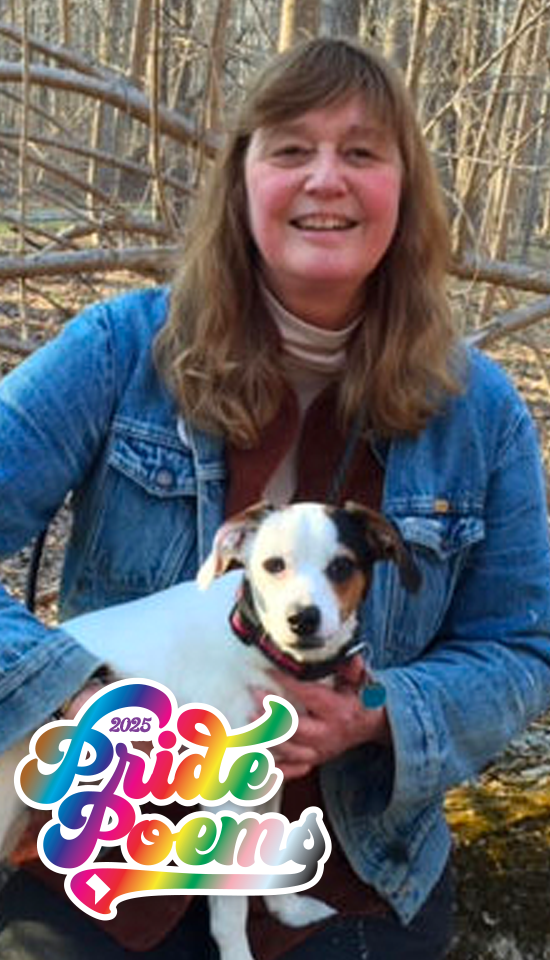
View Poem TextView Poet Biography
Claustrophilia
Cherry Crush is my favorite lipstick.
When Worlds Collide, my movie of the week.
Why don’t we paddle on out, you and I,
to that small place in the lake where the moon
is skirring to drown. She’s lonely up there
in a way only she knows but I know
a good thousand ways to be near.
Why don’t we try a new game named Fleas-
in-a-Thimble, why don’t we shake up
a cocktail called a Neutron Star?
To be honest I have a body unhappy with space
between bodies, to be truthful I’m hearing
a rumor you do your best work in the clutch.
Why don’t we start a hot dance craze, the Grace
Under Pressure, open a roadhouse,
A Face in the Crowd – I’ll wager I could
tighten a cold coal into a diamond, frottage
a bundle of sticks till they flame; I’m betting you
could scrounge up a mattress the size of a match
box, carry a torch which burns the house down.Hailey Leithauser is the author of SWOOP, (Graywolf 2013) winner of the Poetry Foundation’s Emily Dickinson First Book Award and the Towson Prize for Literature and SAINT WORM (Able Muse 2019). “Claustrophilia” is from a new manuscript, poems from which have appeared or are forthcoming in Agni, the Gettysburg Review, Poetry, the Yale Review and Best American Poetry 2025.
Previously appeared in Copper Nickel (Fall 2020) with permission of the author“The Towels” by Hiram Larew

View Poem TextView Poet Biography
The Towels
Stones wake my creek
While weeds thick the crowing
And every cloud opens
Yes from here to where hills drift away
From here to where branches meet
I miss you my friend
As much as early
And from beyond any breakfast
Or further than bath towels travel
Towards daybreak
Or no matter the asking windows —
I’m not sure
How far you will go
But just like bread and its jam
Or shade on the bed
I hear you turning some corner
Yes every crumb of you
So early
(And oh yes I tended to take
Chuckling for granted)
So tell me my friend
How did you and mornings like this
Become such light-hearted so-longs
In the making
Larew’s seventh collection of poetry, This Much Very, was published in 2025 by Alien Buddha Press. As founder of Poetry X Hunger, he’s bringing a world of poets to the anti-hunger cause.
Previously appeared in D.O.R. Reprinted with permission of the author.“Ephemeral” by Jona Colson
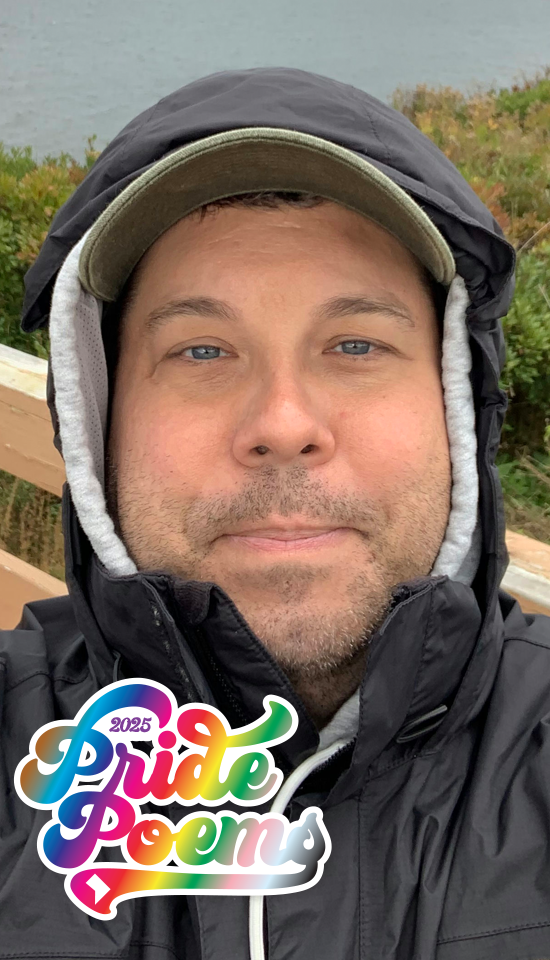
View Poem TextView Poet Biography
Ephemeral
(from the Greek, ephemeros, lasting or living only a day—
short-lived creatures or insects)
A down-draft of a white cloud, or a frog
diving into the river like a stone.
Maybe something inside—a skipped
heartbeat of a man I tried to kiss.
A mayfly touching her feet to a bay leaf.
Some things are best forgotten.
My father snapping a tomato vine,
close enough for me to see but not cherish.
I am walking hastily to my own extinction
like the luna moth breaking open in rain—
when all my rescues are gone, I’ll remember
the pour of milk, a coo of a bird,
my mother’s hand waving through glass.Jona Colson is an educator, poet, and translator. His poetry collection, Said Through Glass, won the Jean Feldman Poetry Prize from the Washington Writers’ Publishing House. His poems, translations, and interviews have appeared in Ploughshares, The Southern Review, LitHub, and elsewhere. He is co-president of Washington Writers’ Publishing House and edits the bi-weekly journal, WWPH Writes. He is a professor of ESL at Montgomery College and lives in Washington, D.C.
Jona Colson is a resident of Dupont Circle.
Previously appeared in Capital Queer: A Pride Celebration from Washington Writers' Publishing House Reprinted with permission of the author.“Promulgate: Triple Haibun” by Danielle Evennou
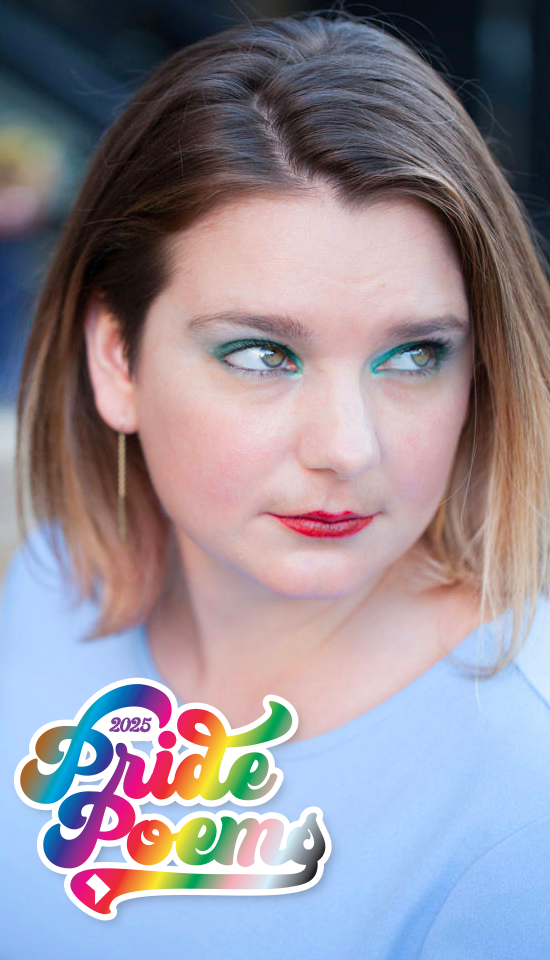
View Poem TextView Poet Biography
Promulgate: Triple Haibun
I.
To make known openly on Facebook and basement fraternity parties that there’s nothing I love more than eating pussy in West Hollywood hotel rooms. Pleasure at the cost of debilitating loss. My first love destroyed. My family estranged. My friends repel me. Gay boys sympathetic toward my effeminate ex-boyfriend. Everyone looks at me like a lying stranger, a voyeur in the dorm’s collective shower. Shrouded in pain and politeness, I move to a city that doesn’t know me. Search for everything I need on Craigslist.
eat pussy freely
West Hollywood love story
in search of touch meII.
To make official in law the way our bodies can intertwine. I imagine illicit bath house scenes because I’m too shy to interview at the front desk to be the token “bi-woman” who they let in. Fill up the emptiness with MidAtlantic Leather Weekends, quirky strip clubs, and a Sean Cody account. Irked at the insistence of closed-toed shoes at the Eagle. Bored in a sex dungeon. Follow the handprints on the sheets to where I fit in. Doing whatever it takes to avoid cocaine in Brooklyn.
the law of bodies
names the token “bi-woman”
cocaine on the sheetsIII.
To force into action, generations of community who never stopped defending. Tranquil Northampton crockpot bubbles up. Roils. Cauldron of Los Angeles fires melting provocative sculptures. Meanwhile, trans people claw together their paperwork. Marching in the rain makes the rainbow an irrelevant t-shirt from Target, selling us out publicly to appease the current powers, facing certain mutiny.
community force
clawing together paper
melting the rainbowDanielle Evennou (she/her/hers) is a writer who grew up in suburban New Jersey. For over a decade, she has kept herself busy by hosting poetry readings, workshops, and open mics in Washington, DC. In 2016, she founded Slipform, a writing workshop that explores gender, sexuality, and formal poetic structures. Her poetry and memoir appear in apt, Beltway Poetry Quarterly, Dryland, and Split Lip Magazine. Her chapbook, DIFFICULT TRICK, is available from dancing girl press. With the help of therapy, she is learning how to calm the f*** down.
Danielle Evennou is a resident of Langdon.
“Let Me Go” by Zoe Carver
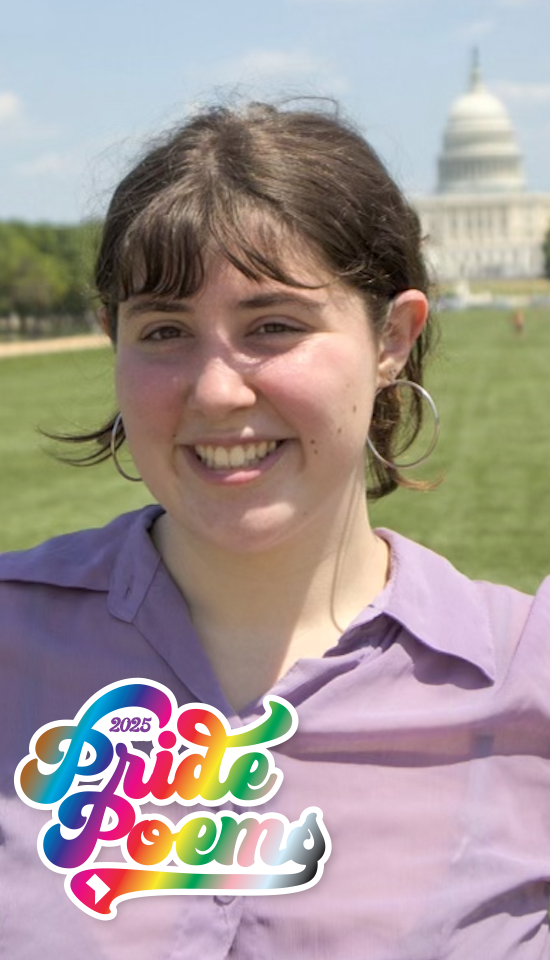
View Poem TextView Poet Biography
Let me go Like a ghost, she whispersLet me goShe comes to me around every street cornerHer face is buried in every crowdAs it blurs into the hustle, she breathesLet me goCraw the bird that flies past my window, and it is herAnd it sighsLet me goLet me go like the wind that catches some sparrow’s wingLet me go like rain washing down the sidewalkAnd the slow swish ofour galoshes in muddy pilesAnd she is a part of me, or daredTo always dare to beLet the days flood with time thick like waterPlease, she begs, and it is a growing thunderLet me goLet me go like the fruit that bloomed and soured inthe wicker basket by the sinkAnd as the specks of mold fetteredIts once smooth fleshShe laughs and squishes its rotted body in her handsJuice running over her fingersNow seed deep in some faraway earthShe smiles that ghostly smileLet me go
Zoe Carver is an emerging writer and 2025 graduate of George Washington University, with a BA in International Affairs and minor in Creative Writing. Mainly a fiction writer, her work has been published in October Hill magazine, Rainy Day magazine, and Capitol Letters magazine, where she is also a senior editor. She is originally from Portland, Oregon, often trapped in the policy world of DC, and more than happy to carve out space for the beautiful literary community in the DMV.
- Find Zoe online:
- i
Zoe Carver is a resident of Foggy Bottom.
“Dear Mom” by Richard Hamilton
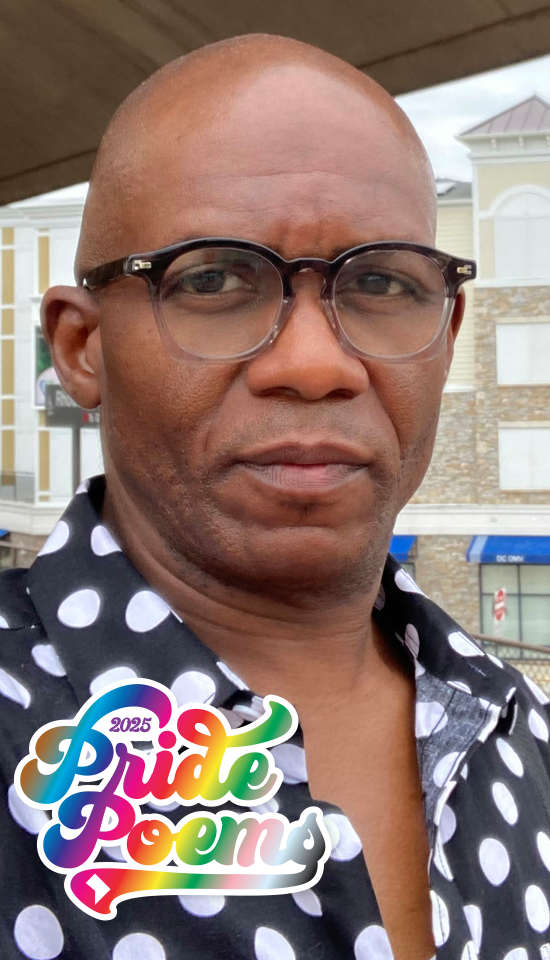
View Poem TextView Poet Biography
Dear Mom,
(Passing at the age of 52!?)On cancer crowding what is mouthed
The poorly drugged Gods rarely pardon.
Her face lily dark as a Roman coon
Death-cleaved egregious unlike brown
Fatal to the limp choice-word. I held out
For Lucy under fetid moon. (J. Marion Sims
Opaque as rain, without sense. The enslaved
For experiment, drift past her flowersDormant inside privatized ground,
Dream-littered with hypodermic needles.
The ghastly scent is gone bouquets
By speculum and “betters’ I suspect
That nothing ever flowered.*
Are hours for which nothing can be done
Her likeness, mine, being outside? Provider
Insurance heaped clownishly high like pears
Are gold leaves. The look of mendacity
Moss green a seedling immedicable
Woes. And just who provides, provided we fall?
Incipience, and perhaps it all began
The Day Lady Died, the stentorianRed of indifferent lights, lives to save
Like a child to his goldfish bowl.
Everything stops (the air) but party to
Wonder is bright sheet music.
Was her likeness, mine as to smoke, water
The promise of tears that nobody hears.*
To hate. Today that pail of fire ants
You hurled at God in the form of a son
His claim of innocence that afternoon
Like sorting metaphors for the right
Warrants a trip down southern roads
Past poor white carrots of color. Dust-fed
Farmers in plain overalls boiled
For the young ‘gal’ that dared stand up.If I had my way, those gouged and chided
To mind, that boy who called you nigger,
Would loot confounding constellations.
His father’s needful office, like pink eye
Would yield science and so-called rational aims.
The soil and sinew would have their say.Richard Hamilton (he, they) was born in Elizabeth, New Jersey and raised in the American south. A poet and critic, his poetry has recently appeared in Lana Turner Journal, Tahoma Literary Review, Obsidian, and Notre Dame Review. Richard is the author of two books of poetry, Rest of Us (Re-Center Press, 2021) and Discordant (Autumn House Press, 2023). He holds and MFA in poetry from the University of Alabama and an MA in Arts Politics from NYU.
Richard Hamilton is a resident of Southeast DC.
“Nocturne: Roses” by Malik Thompson
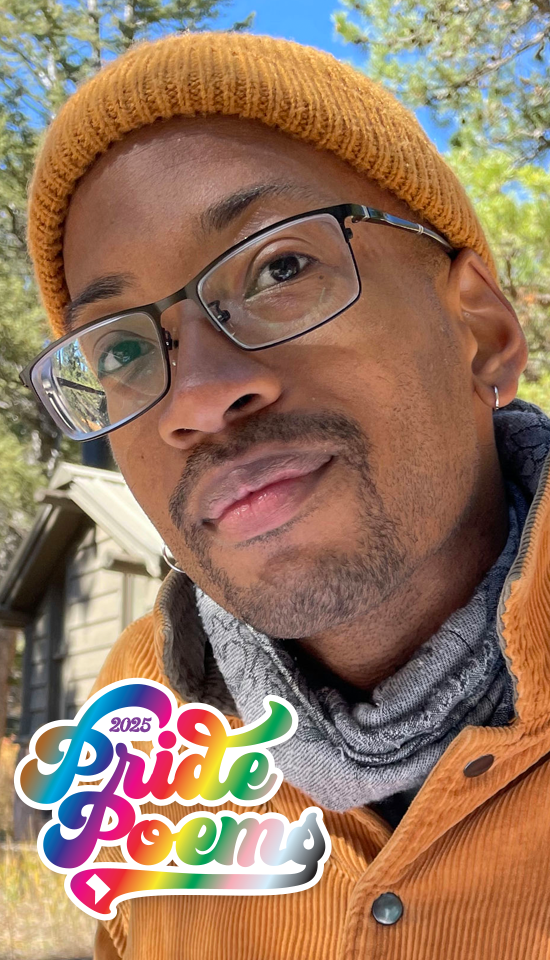
View Poem TextView Poet Biography
October, & the roses lose their season.
The fragrant things fall & wither,
petals of soft blood scattered
along wind-kissed pavement.
Tonight, the neighborhood is flooded
with starlings & their sweet racket,
dark clouds flitting
between recent trees. A slow bend
in the supple branches,
the outspread hand I extend
to this autumn night’s black teeth.//
We stroll through an autumn night’s black teeth,
& he speaks of low-wage jobs & savings.
His anxiety crawls between my lips,
& a wave of tar slaps at my stomach’s
crimson lining. From within a veil of stale
air, he faces the street of redlined houses
& voices possessive desires.//
Even the voice possesses desire—
birdsong. The poisoned starlings’ racket.
Mote of black silence between myself &
this strange man. If I could gather a field
of broken hours; if I could cleave wind
with these long hands; if
what lay between us were merely
bad air swept into blunt crescent—but it is
October, & the roses have lost their seasonMalik Thompson (he/they) is a Black queer person from Washington, DC. Having worked in independent bookstores for many years, he is also the former Co-Chair of OutWrite DC and has taught workshops for the University of Wisconsin-Madison, the Hurston/Wright Foundation, and other organizations. His work has been published in the Cincinnati Review, Denver Quarterly, Hayden’s Ferry Review, and elsewhere. He has received fellowships and residencies from organizations including Cave Canem, Lambda Literary, the Anderson Center, and Monson Arts.
Malik Thompson is a resident of Mt. Pleasant.
Previously appeared in Radar Poetry. Reprinted with the permission of Radar Poetry.“Sweetness” by Peter Montgomery
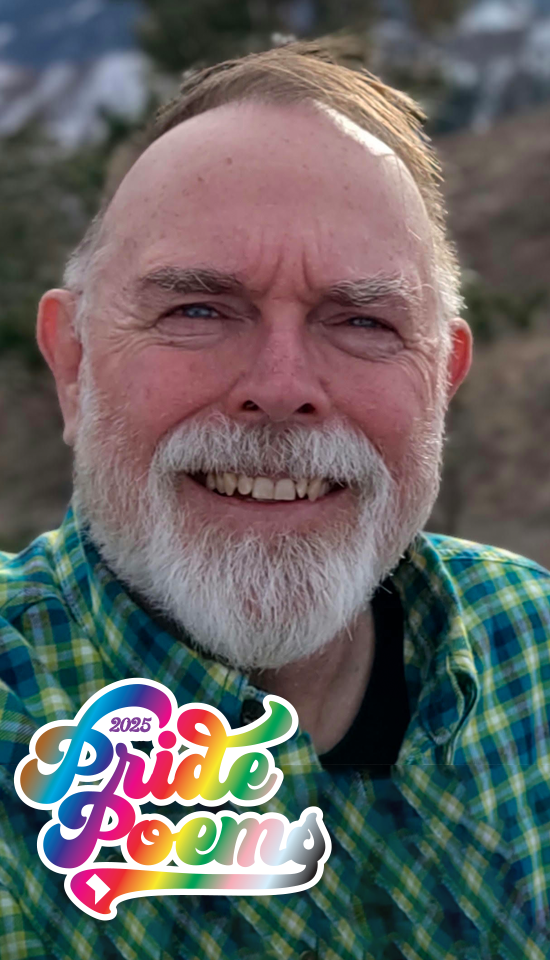
View Poem TextView Poet Biography
Sweetness
Waking early to get to work,
I slip silently from the sheets,
leave the serenely snoring dog
beside my slumbering husband.
In the next room I flick a switch.
Light falls on a patchwork heart,
red and pink, stitched from squares
and irregular triangles of soft cloth,
glimpses of rose, green, and gold,
gift from the deep-sleeping quilter,
owner of his own beautiful heart.
Thinking of the industrious hours,
I pause to look up Saint Valentine,
learn that he is beekeepers’ patron.
“That’s perfect,” I think, picturing
all the colonies of persistent bees,
carefully tending to their honey.Peter Montgomery is a researcher and writer, lover of poetry, and admirer of the DMV’s literary community. He has published poems and essays in Beltway Poetry Quarterly. He lives in Brookland with his husband and their rescue dog.
Peter Montgomery is a resident of Brookland.
“TV and Me” by Bernard Welt
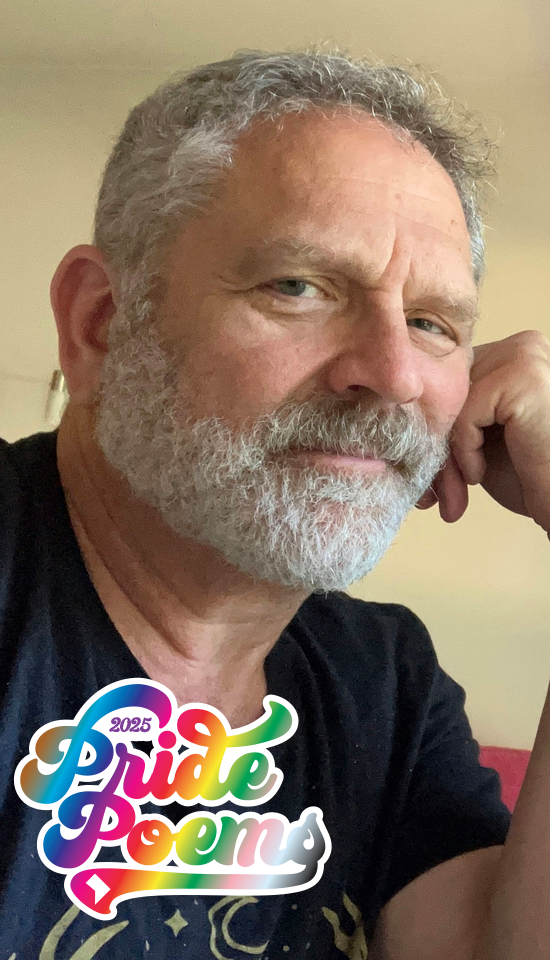
View Poem TextView Poet Biography
TV and Me
I have been hanging out with TV—as I like
To call him—for years, and now
We’re finally going to make it legalI remember thinking so often: the men
On TV–They’re so cute! Till one day
I realized: Schmuck! It’s TV that’s cute!TV was dashing, well-traveled
Sensitive, entertaining as hell
Always ready with a joke
Or a reassuring word.
And oh my God, the things
That guy knew about. There’s, like,
Nothing I can think of
That he’s not an expert onA long time passed before it
Snuck up on me: we weren’t
Just friends any more. Like a real
Lover, he was always with me
Even when we were apartAt work, out with friends, I’d
Catch myself thinking: When
Will I see him again? What’s he
Up to tonight? Maybe I should
Check his schedule. Was he
Thinking about me? Then
The next time I’d see him, it was just
So endearing: he’d saved up a ton
Of wonderful things to share just with meI worried: How do you tell real love from
Infatuation? I knew I yearned for him
But I wondered: Did he . . . desire me, too?
I mean, he never made a move
But maybe he’s just old-fashioned that wayThings got serious. More and more
He talked about us being together
Same time next week, then months from now.
Before long it seemed like we found reasons
To be together every daySeasons came and went
And we were still together
TV was ready to tie the knot
While I was still on the fenceBecause here’s the thing:
TV’s always known me
Better than I know myselfI don’t know why it took me so long
Maybe I just couldn’t believe
TV was as wonderful as he seemed.
Maybe I just wasn’t ready
For someone to accept me just as I amBut TV—TV made me see that I’m beautiful,
That I’m worthy of love, that even my faults
Are just opportunities for improvement.
And TV—TV really helped me with that.I brought TV home with me
Introduced him to the folksMom took me aside:
Son, what are you waiting for?
He’s gorgeous. And in case
You can’t see it, he’s crazy
About you. Are you sure
He’s gay? Because I’d throw over
Your dad in a sec for this one.
I think she was joking.Oh yeah, I saw TV giving my mom
The eye, engaging my dad
With his banter about home
Entertainment centers
And gardening implements.He’s just so full of charm
It’s like a light that shines
Out of every pore. If
He has a fault, it’s that
Once he gets turned on,
You just can’t shut him up.No one’s ever given so much
Of himself to me and it’s like–
I don’t know, like he needs
Nothing from me but devotion
And he makes that so easy to giveOne thing we’re sure of: the wedding
Will be a small, private affair. Because
After all, whatever we seem to be
Out in the world, at heart we’re both
Happiest when it’s just the two of us
Communing the whole of an evening
Till I drift off to sleep
In the warm glow of his loveCall me a fool, but I feel like
This is forever. The two of us
Making our own little world, two
Hearts as one, eyes for only each otheralthough
Lately the internet has been glancing at me
With the strangest look in its eyeBernard Welt’s poetry has appeared widely in journals, art catalogs, and anthologies including The Best American Poetry 2001 and 2024. He has received a US National Endowment for the Arts Creative Writers Fellowship and a Lambda Literary Awards nomination.
“the river flows” by Adriana M. Martinez Figueroa
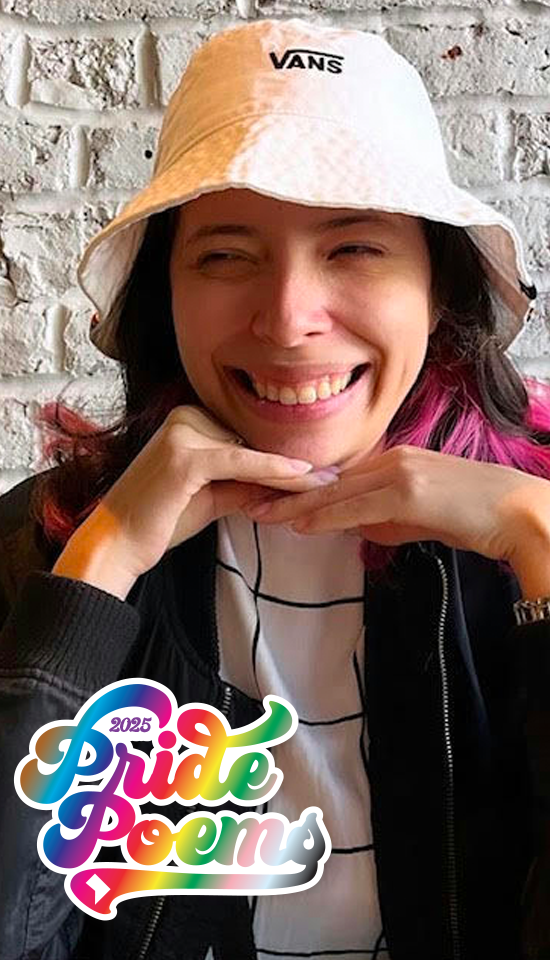
View Poem TextView Poet Biography
the river flows
wasn’t this where the river ran through?
where the water raged
after the expulsion and exile
after the violence
after the flood
didn’t the river run from the mountain?
its haven?
didn’t it make its way down
under bridges
through dams
weaving through bacalao and other freshwater fish?
swept through the family
swimming in the cold?
pulled lagarto into river,
down
down
until it reached a new town,
cogiendo pon?
wasn’t this where the river ended—
meeting the crush of waves
where sweet meets salt
where blue meet bluer, greener, brighter,
deeper?
in the end,
isn’t an ocean
the place
where river
goes to sleep?Adriana M. Martínez Figueroa (they/she) is a bisexual Puerto Rican writer, editor, and sensitivity reader. They hold a B.A. from Iowa State University in Women and Gender Studies with a minor in US Latinx Studies. Their words can be found on Bustle, Tor.com, Boricua en la Luna (2019, Até Mais: Latinx Futurisms (2024) and Good For Her: An Anthology of Women’s Wrongs (2024). They live in Washington, DC with their husband.
Adriana M. Martinez Figueroa is a resident of NoMa.
“Ode to the Old Growth Forest” by Xochi Quetzali Cartland
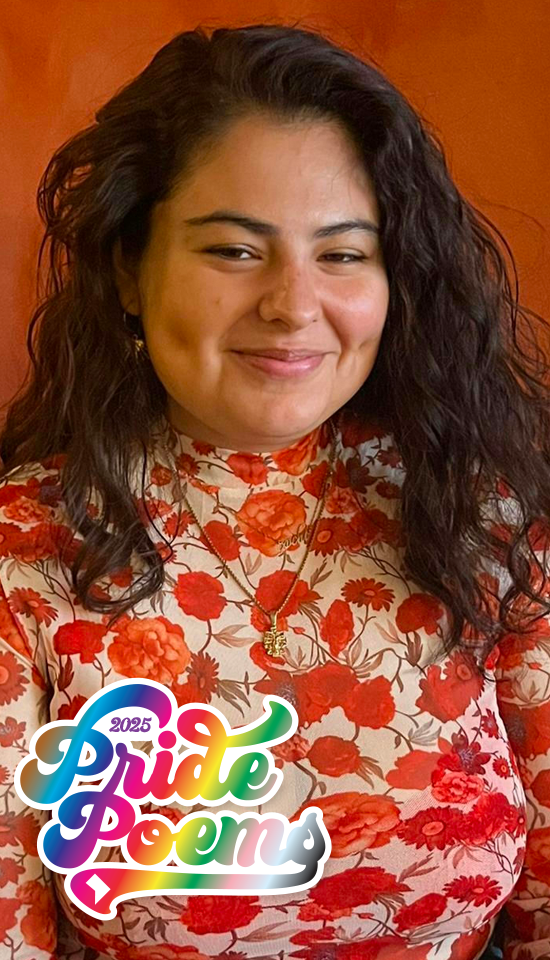
View Poem TextView Poet Biography
Ode to the Old Growth Forest
In the kingdom of her body are the redwoods,
thighs that rise & rise, the branches of her hips
spread searching for every scrap of light.
At 300 feet high, she keeps a full home.
Cambium hiding in the canopy of her bones,
food for the salamanders & marbled
murrelets who like to play in the hollow
of her iliac crest. She is sovereign & stratus,
my sequoia that sweeps the air clean.
With each passing year she collects
some more heft & another ring,
ancient wisdom to withstand rot & wind
& men who carve their names into her
still-living-skin, cruel in their assumption
that she’ll heal up just fine. But she did.
& she does. Because to be big is to be
steady enough to survive. Though it is hard
to be planted—to never escape
your own roots. Her thighs are the throne
that holds up the north coast.
The trunk of her indomitable crown.xochi quetzali cartland is a queer Mexican poet & seamstress from the DMV. She holds a BA from Brown University in Literary Arts, and her work has appeared in Common Ground Review, Little Patuxent Review, Muzzle Magazine, Death Rattle Literary, ONLY POEMS & elsewhere, as well as supported with fellowships from National Arts Strategies and Brooklyn Poets.
- Find Xochi online:
- i
Xochi Quetzali Cartland is a resident of Dupont Circle.
“My Struggle” by Jessica Austin
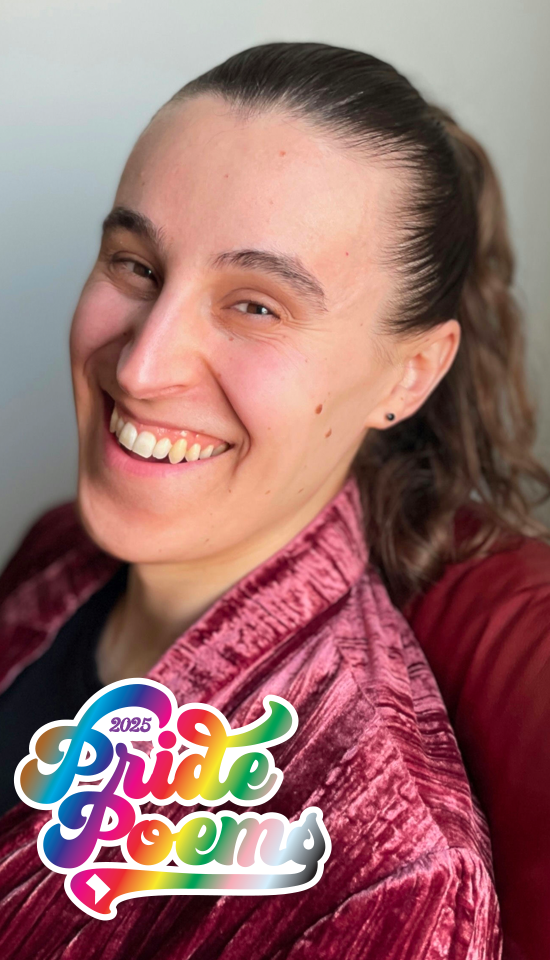
View Poem TextView Poet Biography
Our very own lebensraum: the Gulf of America, Greenland, and Canada, too.
I fear I’m overstepping here, but President Jackson’s portrait is back
In the Oval Office. My heart goes out to all the very fine people in the crowd,
He said with a wink. It’s the Inauguration, after all. Out with the old: Critical Race Theory,
In with the new: Great Replacement Theory. I’ve seen his right hand man
Gesture vaguely at multiculturalism and German values, like it’s his
Manifest destiny to assuage the AfD of their past guilt.I’ve seen the executive orders, too, and I think to myself
Legally speaking, do I even exist? And for how much longer?
You see, kids, gender is a spectrum. At least, it used to be. Talk about
A thought terminating cliché. Now it’s just a single letter on a birth certificate,
A driver’s license, a passport. With a few snips here and there…
But there I go again, thinking I can solve all my problems
With surgical mutilation. My K-12 education is showing,
And it’s scar(r)ing the children.By some accounts, I’m a well-groomed male. Because, well, I’ve
Had the surgery. It was pioneered by Magnus Hirschfeld, you know. He practiced
Radical gender ideology, too, and they burned his books for it. Queerness, you see,
Was a Jewish perversion, and now it’s anti-American teaching.
The enemy from within, as defined by the presidential pen.
A modern Dolchstoßlegende: a Democrat, a gender extremist, and a cultural Marxist
Walk into a bar, and George Soros pays for their drinks
While the TV blares, “Kamala Harris is for they/them.” And it’s true,
I use gender neutral pronouns. At least, I used to. But I don’t talk about X anymore,
I deadname her like the productive citizen I am.Sorry, I’m forgetting myself, what is it they used to say? Trans women are women?
But tautology is so impotent in the face of male violence, isn’t it?
Just grab them by the pussy, if they even have one,
To protect girls’ sports. Never mind that they’re children.
No, sexually exploiting minors has much more to do
With pronouns and a change of clothes,
And he cleans up real well.Jessica Austin (she/her) is a queer, trans writer living in Washington, D.C. She has attended the New York State Summer Writers Institute and the Tin House Winter Workshop as a 2025 Winter Scholar. Her work has been published in Lilac Peril and the citizen trans* {project}.
Jessica Austin is a resident of Petworth.
Previously appeared in the citizen trans* {project}. Reprinted with permission of new words {press}.“Cuffing Season” by Natalie E. Illum
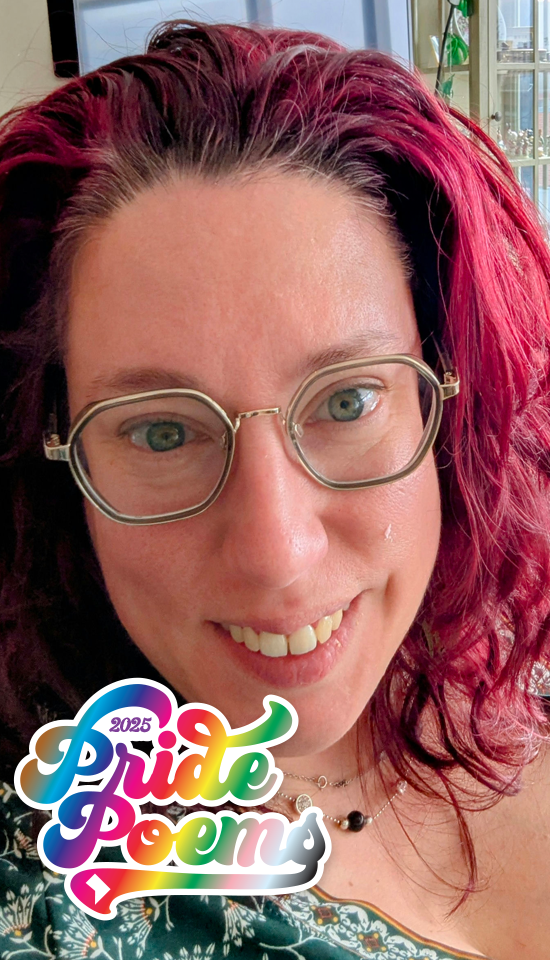
View Poem TextView Poet Biography
Cuffing Season
I felt your two hands
bury me to release its splendor. -Louise Gluick
This is the time of year when I spoon
with my demons and they stroke my cheek
like a first love. When I crush so hard “
on my failures and they flirt back like
they mean it. When the light shifts,
my friends also
turn inwards; return to their own DNA
for warmth, whisper things to partners in private
and my lonely is so loud, they mistake it
for a dance party. It is not the season
for dancing. It is the season
for stretching one memory so thin
it dissolves into its opposite.
The I love yous bruise over.
The see you tonights becomes
next week becomes never.
I want us to be humid again,
tangled in our hair and hope.
The way you smile.
You tilt your head toward
the sun like any vine would.
Our fingers can form roots
in the right temperature.
I’ve seen it happen before.
Now the air smells like snow and the radiator clicks and
I can’t find a stranger to embrace and I am
stranger without you. So I write you missives,
turn letters around the spit in my brain
for warmth and wait for you; another season.
Natalie E. Illum is a poet, singer and disability activist. She loves giraffes, house plants and whiskey.
Natalie E. Illum is a resident of Mt Pleasant.
NA“Against Identification (for Willem Arondeus and Frieda Belinfante” by Luke Johannes Sutherland
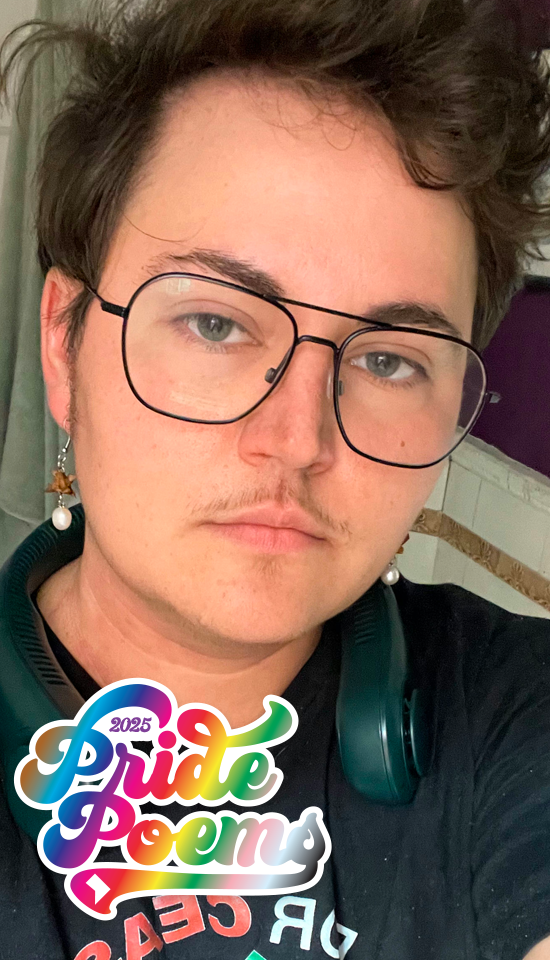
View Poem TextView Poet Biography
AGAINST IDENTIFICATION
for Willem Arondeus & Frieda BelinfanteTranssexuals are not cowards
but if you dare look at us
and let “brave” fall from your lips,
don’t shrink from any side eye
sizing you up.Is it brave to desire,
to act on that desire?Bearing the wet bite
of Amsterdam in March
with bombs in tow, hung
-over from amphetamine
fueled nights of throwing
sand in cogs, a gay rave
by any other name;the smell of singed cardstock
stuck smartly to the suit collar
of a level-headed butch,
or to the wrist of a militantly
flouncing faggot (prelude
to a dead fascist,
tastes better than sex,
feels better than symphony.There is pleasure in the forge
-ry, of murder sabotaged,
eight hundred thousand
now unidentifiable, still
alive outside the camps—
for now, for today.Is it desirable to be brave,
to act on that bravery?Transsexuals are not brave
but necessary, inevitable.
Passports or identity cards,
all documents burn:
write it in my blood
if you must.Luke Sutherland is a writer, librarian, and publisher on Piscataway lands, so-called Washington D.C. His debut chapbook Distance Sequence won the 2023 OutWrite Chapbook Contest and was published by Neon Hemlock Press. He was a finalist for the Larry Neal Writers’ Award, the Black Warrior Review Flash Contest, and the SmokeLong Quarterly Award for Flash Fiction. He is an interviews editor at smoke + mold and co-founder of the DC-area trans small press Lilac Peril. You can find him online as @lukejsuth.
Previously appeared in CAPITAL QUEER: A PRIDE CELEBRATION FROM WASHINGTON WRITERS’ PUBLISHING HOUSE (WWPH, 2025). Reprinted with permission of Jona Colson.“Seeing” by holly mason badra
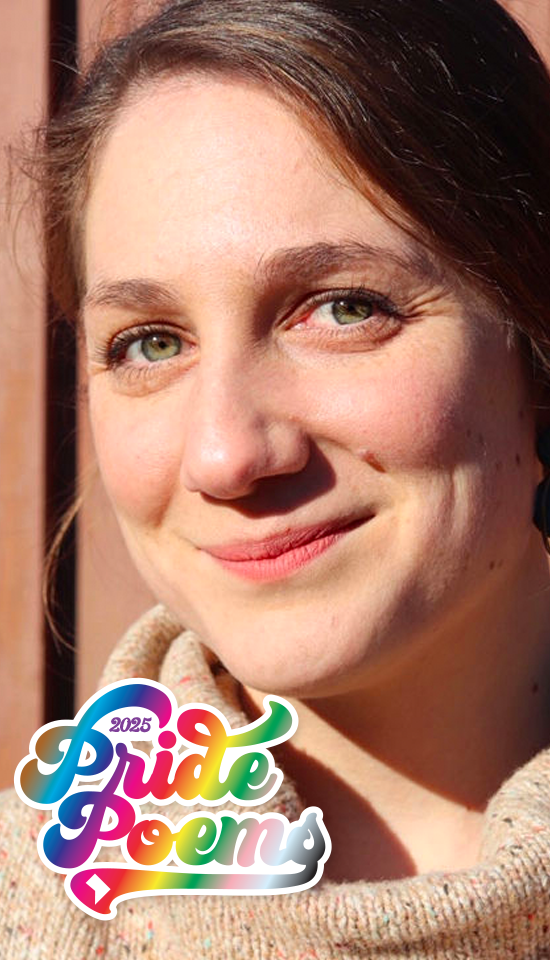
View Poem TextView Poet Biography
Seeing
I.
“Koi,” in Japanese,
is homophonic for the word “love.”
Koi fish can recognize
the person that feeds them.
Circling your mother’s
pond,
they open their wide mouths
to vanish the pellets.
II.
Klimt’s ladies in gold
Flowers in their heavy amber hair
Subject of the female body
A hunger
III.
“Don’t look directly at it,”
you say, “I know it’s hard not to
because I was doing it, too.”
“I’ve never seen it so close,”
I say, “and so bright orange.”
“It’s pink,” you say,
“I think we see colors differently.”Holly Mason Badra is a queer, Kurdish American writer living in Northern Virginia. She is the associate director of women and gender studies at George Mason University. She is the curator-editor of the forthcoming anthology, Sleeping in the Courtyard: Contemporary Kurdish Writers in Diaspora, coming out summer 2025 with The University of Arkansas Press.
"Seeing" previously appeared in Bourgeon. Reprinted with permission of Bourgeon.“For You I’d Create a New Language” by Jasmine Haskins
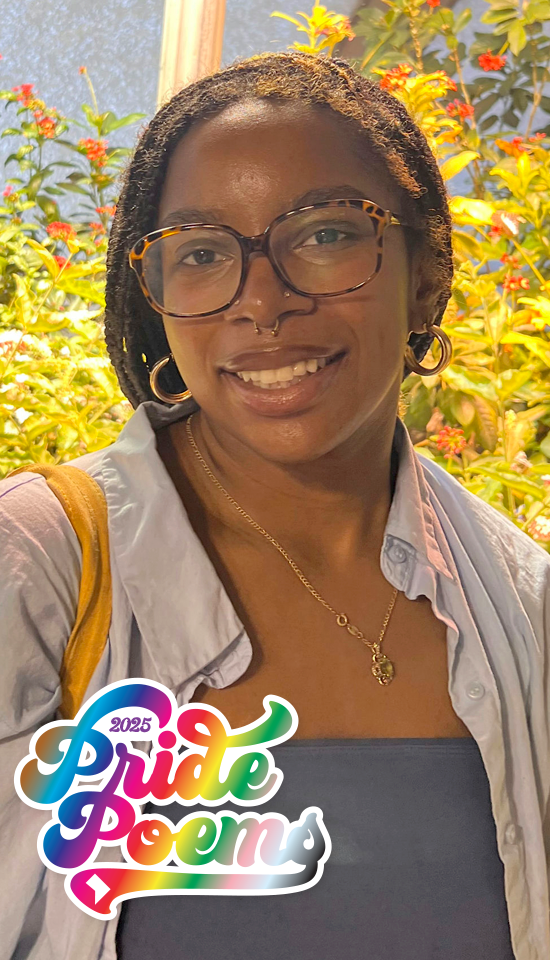
View Poem TextView Poet Biography
Picking purple petals in a field
With no flowers. Chipping away,
At painted nails that happened
To be the shade I mourned.Scattered to the wind-
Is what I would like to say.
Oh, how april showered
The flakes, turned flowersThat included some skin;
Back down to me. Rejected
Damage that will soon
Breed infection within me.The tips of my fingers a tinge
Violet, next to the violas,
And I hear violins out of tune
Violently harmonious. UntilI dove my head into untilled soil,
So the doves would stop
Circling my brain like vultures.
Plum, is the suckle, that honeyDripped with nectar they now
Come for, and encumber me.
In their nest, lapping up
The lilac syrup sloppily.A mess on their chest fulfilling
Their bellies, and breast till these fat birds
Mumble a faint hum and now drained all mums
Of juice, from grapes turned wine.After feverish ferment from
Drunken rants to relent against
Black roses; that have rose from
The palm of my hand. Knelt on riceForming welts of maroon
Patties. On my knee, a sting from a
Bee makes me rise from the sod.
As I wince at the sun now soughtThrough the shrouds of drapes, they
Formed clouds on the window. Bold in color,
The tone gold to others of a wedding band
Ready to marry in the meadow of sweet flowers.Showered down on me is the ray,
Portrayal of hope denotes dismay.
For this may, the parades shall march,
A brilliant band through the remnantsOf your garden. Hardening the parched
Patches you once whispered batches
Baked, now packed with the lackluster-
Words of love, you called language.
Jasmine Haskins, is a GMU Alumni and Creative Writer/Poet from the NOVA area. She has a passion for poetry and finding new ways to get involved in her local writing community. Using her words in news ways to explore the ideas of human nature through rhetoric and complex emotion.
“The Root of All” by Natasha Sajé
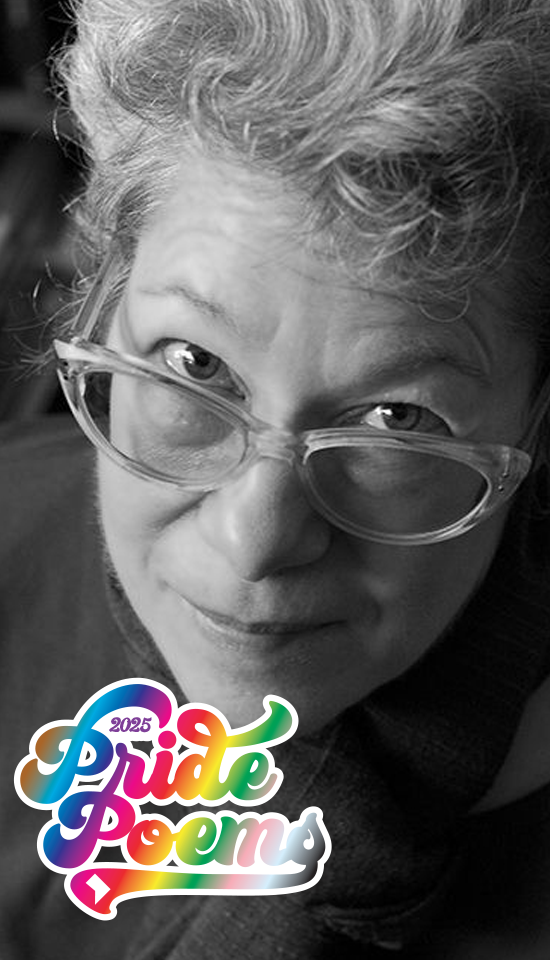
View Poem TextView Poet Biography
The Root of All
burns a hole in your head
sprouts wings and flies
won’t bark up the rightunless you shell out or marry it
hand over fist penny wise or not
occasionally pound dumbafter a certain yearly sum it can’t buy
you know what but up to then
finders keepers losers
reapers picking millet from a field
or apples from the cart upset
during short sell and hell to paysomeday not today I’ll take
bruised ones fallen
into gutters so as not to losemy skirt or need to pluck
a tin spoon from a sow’s ear
I want more but won’t bitethe fingers that squeeze me
time is not blood from a turnip
so pay as you go or go as you wishchew the bacon
and bring it home like my hand
knit sweater bought on thriftthat will burn when I do
since it can’t pass
through the eye of a needleNatasha Sajé was born stateless in Munich, Germany, and grew up in New York City and its suburbs. Her books include The Future Will Call You Something Else (Tupelo, 2023); a postmodern poetry handbook, Windows and Doors: A Poet Reads Literary Theory (Michigan, 2014); and a memoir, Terroir: Love, Out of Place (Trinity UP, 2020). She teaches in the Vermont College of Fine Arts MFA in Writing Program and lives in Washington, DC.
- Find Natasha online:
- -
Natasha Sajé is a resident of Cleveland Park.
Previously appeared in The Future Will Call You Something Else (Tupelo, 2023). Reprinted with permission of the author.ross“Salt Water” by Amanda Esteves Correia
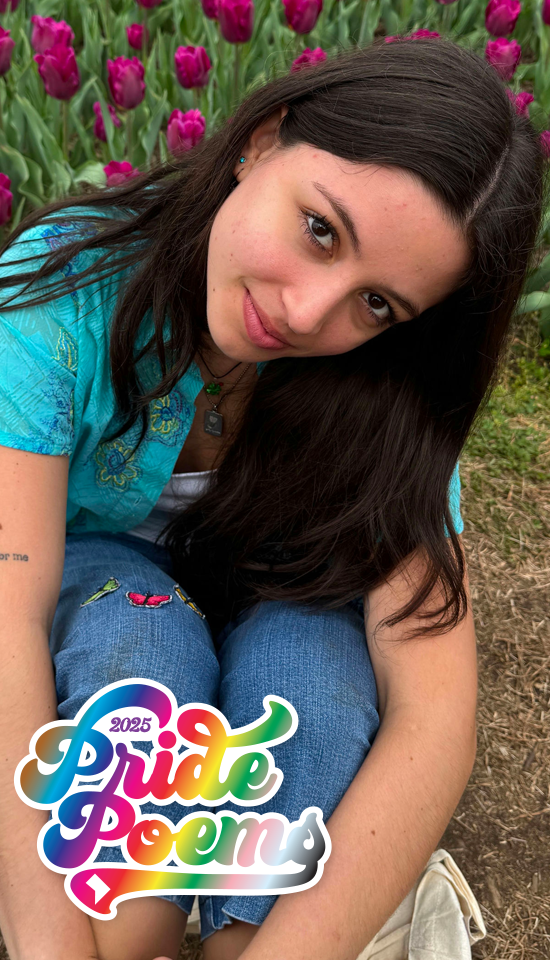
View Poem TextView Poet Biography
Daughter of Iemanjá I am
Iemanjá
who crossed the Atlantic Ocean
from Africa
to BrazilPortuguese men
stripping naked
African men
stripping Their identities
from Them
they took everything
gave Them a price
woundsIemanjá bathed Their wounds
in salt water
in the waters of BahiaIn the same waters
I bathe myself
I jump seven waves
thank you,
IemanjáThe salt water burnt like fire
healed
hurt
burn
heal
hurtBurnt
in Senzalas
African women stripped naked black-eyed peas
stripped naked shrimp
the ritual
to AcarajéAcarajé, Abará, Vatapá
we feast
in honor
of Iansã
Goddess of fireProtect me
my Guia
don’t touch it
Carnaval
don’t touch me
my three knots
three wishes
protect me
from your fearUnderstand Their pain
I can’t
but
I am from Bahia
Salvador
Salga a dor
those wounds
are not healedI am from Salvador
I am not Them
but I am from Them
this is Salvador
and this is who I amAmanda Esteves Correia (she/her) is an undergraduate student at the University of Maryland, College Park. Passionate about writing poetry and social justice, Amanda uses her writing to explore her identity and experiences. She aims to build a career that reflects her passions.
“His dick looked like an Olive Garden breadstick” by Adrian Gaston Garcia
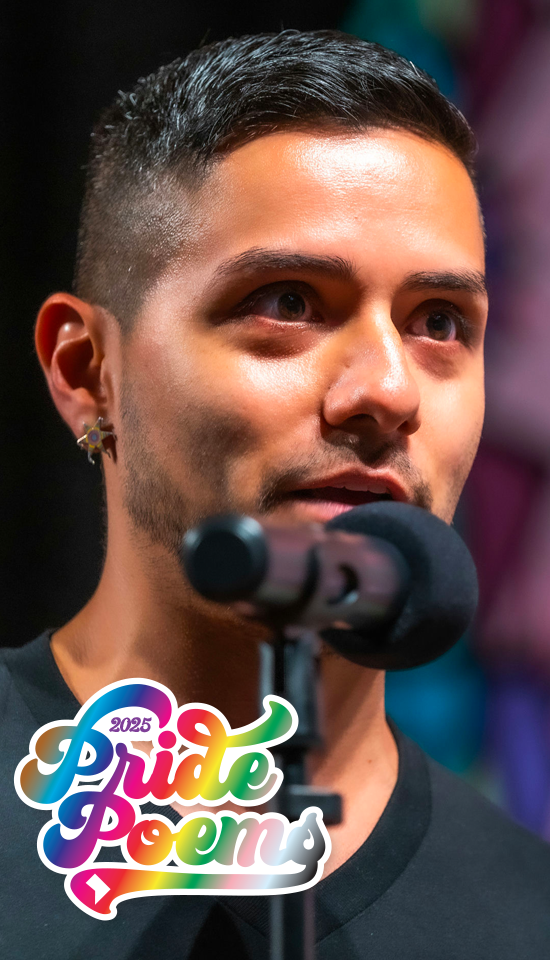
View Poem TextView Poet Biography
His dick looked like an Olive Garden breadstick
So I let him
toss
my
saladWe helped
ourselves
to seconds
thirdsI would
have eaten
all of him
if only
he let meI never
knew hunger
could taste
like thatWe were
unlimited
in appetite,
with mouths
fullWe yelled
demands
for moreHe was
body
licking
goodThat night,
gluttony
flavored
more
sweet
than
sinBut didn’t
last longer
than that
late craving
for a snackThat was
only meant
to be
a guilty
pleasure.Adrian Gaston Garcia (aka AGG) is a queer Latine storyteller whose mission is to share narratives that build community. His work is largely based on his experiences and the intersectionality of his identities. It is a shout out to all the queer brown boys who choose joy as their form of resistance. He is the co-host and producer of Los Bookis Podcast, a podcast for queer Latine bookworms who love queer Latine stories and also the organizer of Tintas DC – a Latine writers group in the DC Metro Area. Adrian is a 2025 Pride Poet in Residence at the Arts Club of Washington.
Adrian Gaston Garcia is a resident of Columbia Heights.
N/A“Feminine” by Vivian Ealy
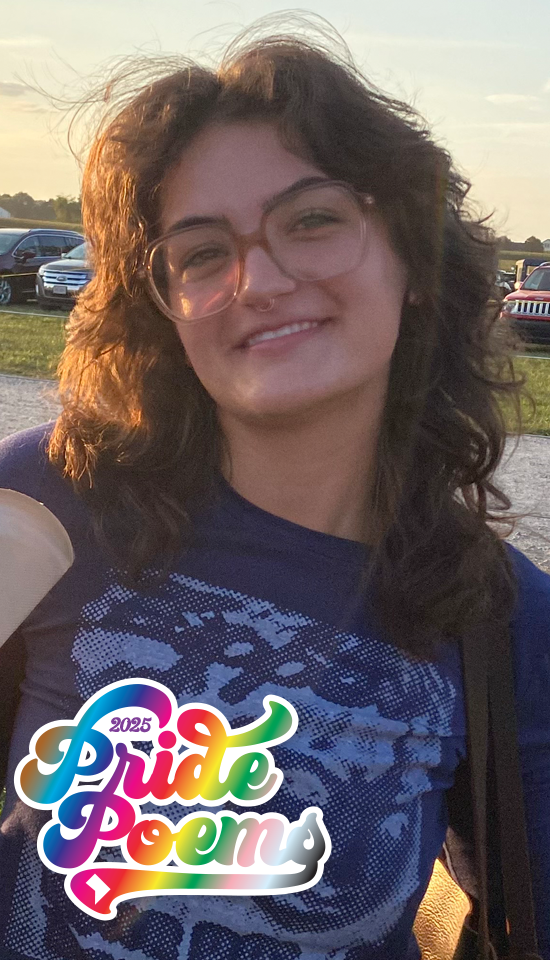
View Poem TextView Poet Biography
Feminine:
“she who suckles”Benevolent body, noble and vehement.
I am
lollipop lip job, born to bear,
bear it back home, all
the way down. A luscious break
down queen,
prone to poignancy
and toddler-like tantrums
of the tenth degree.
Bubblegum blush
colored handgun,
cigarette ash creator, cretin of
cobwebs and bronzer, eyeliner and
lipliner and whateverliner.
Thirsty shell erotica, pig-organed Venus lady
I am
clocked in porcelain,
a genital-bound pig back
Red Sea populus talk, ruler of the
sterile, sultry, stupid of the
ravage, plunder, pillage.
I am
limbs, knock-kneed
mouth, open.Vivian Ealy is a recent graduate from The George Washington University where she studied English literature, Spanish, and creative writing. She is moving to West Virginia in the fall to teach high school English for Teach for America. She dedicates her poems to her angel cat Lincoln.
- Find Vivian online:
- i
“Corrective to the Forgetting” by Sunu P. Chandy
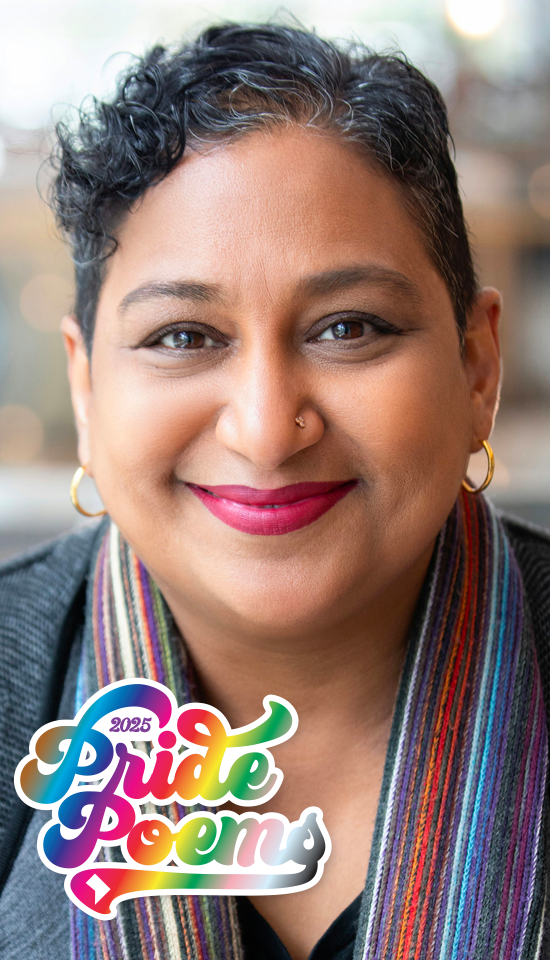
View Poem TextView Poet Biography
Corrective to the Forgetting
Of the 80,000 words in the English Dictionary, 80% are loanwords from other languages
When I commemorated Dr. MLK Jr., Day
with the children in 2025, I said it plainly,
we have more emboldened
haters now. We will need your reminders
of solidarity across borders, across
identities. Race, national origin, who we love,
all the many ways we may identify. In Moana 2
do you remember how they sought out
connections with those who are different,
those across the sea? Do you remember
how people with different skin colors
and backgrounds sat down
together? With enthusiasm
and connection, instead of borders
and conquest. Do you remember
that wayfinder, and how
she wanted to connect?
I will tell you what I am learning now
from my daughter’s history
class. The ways analyzing the art
can tell you so much. Those blue
and white patterns show you
that Chinese people had some influence
in certain places. When you see
florals, and geometric patterns,
you can know Arab people once
traveled to a particular region.
And, in the same way, did you know
this English language
was built from so many other
languages? Do you know that
ballet, illusion, café and dragon
came from French? Pretzel,
kindergarten, and poodle
from German. Drama and geography
from Greek. Espresso and lava
from Italian. Siesta and tornado,
from Spanish. Karaoke and ninja
from Japanese. Chocolate from Native
languages, Aztec, to be specific.
Typhoon and ketchup
from Chinese. Algebra and lemon
from Arabic. Glitch and schmooze
from Yiddish. Cashew and flamingo
from Portugal. Moped from Swedish.
Taekwondo from Korean.
Can this help us remember,
we are one? One global family? Remember,
in Moana 2, how the wayfinder
sought out people
from across the sea? Bangle,
cashmere, shampoo, and cheetah,
all these words from India,
from where my parents came from,
from the many languages
there. I will say it plainly,
yes, the haters do feel emboldened,
but we, we, know better.Sunu P. Chandy (she/her) is a social justice activist including through her work as a poet and a civil rights attorney. She is the daughter of immigrants from Kerala, India, and currently lives in DC with her family. Her award-winning collection of poems, My Dear Comrades, was published by Regal House and features cover art by Ragni Agarwal. Sunu is currently a Senior Advisor with Democracy Forward, and on the board of the Transgender Law Center. Sunu has been included as one of the Washington Blade’s Queer Women of Washington.
Sunu P. Chandy is a resident of Van Ness.
N/A - this poem was not previously published“En Français” by Greta Ehrig
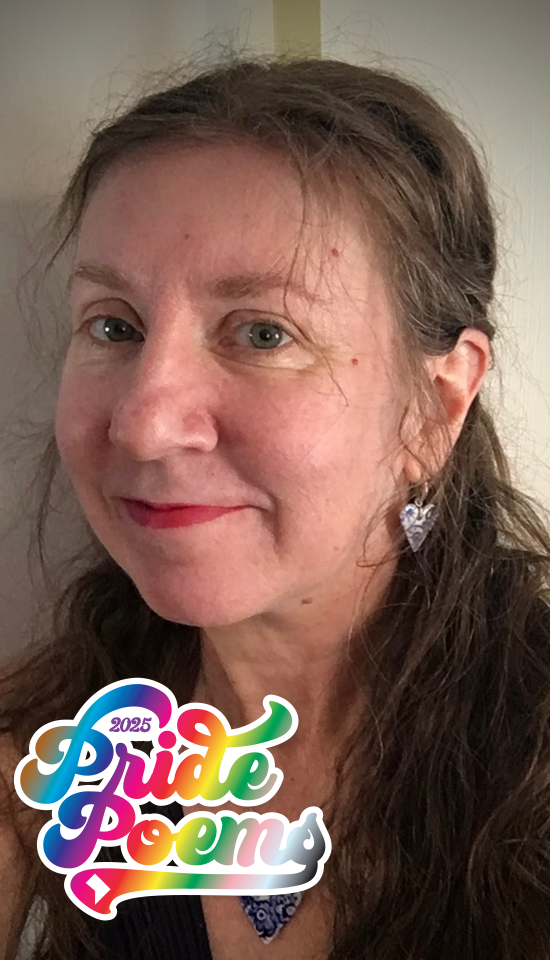
View Poem TextView Poet Biography
EN FRANÇAIS
à Éric
Sometimes instead of singing “Alouette”
as a child, you wish you had learned
a more practical language like that of your
old Spanish-speaking roommate and friendsYou studied French à l’école cinq ans
because your mother studied French in school
and her mother before her had thought it proper
and of use to young people of a certain breedingYour mother in particular took to studying
the culture, cuisine, and art of France and would
later decorate her home with the blue and white
chinoiserie you would come to adoreand keep a piano forte in the corner
so that Debussy and Ravel
might filter the air with an Impressionist light
Still, even though you’ve never been to Parisit has proven useful, over the years, whether in
chatting with cab drivers from West Africa,
ordering the coq au vin on dates, or
flirting with the francophile love of your lifeTu es mon héros, you text him periodically —
declaring that not only is he your hero, but also,
because of the “s,” the source of your eros —
a linguistic holding of the gazeMore recently the two of you thought to keep
your brains sharp, you’d take a refresher course
and parleriez français ensemble while cooking
coq au vin in your own blue and white kitchenMeanwhile, your matrilineal wishes to travel to
Provence and walk through the fragrant fields of
poppies and lavender still call to you
like the morning songbirds call to you au soleilreminding you how even when you were a boy
in school, you used to dream en français
and wake up writing poetry about writing poetry
avec une plume d’oiseauGreta Ehrig holds an MFA in Creative Writing from AU, where she served as Editor of Folio literary journal and was a Lannan Fellow. Her writing has been published in numerous journals and anthologies, including Blessed Bi Spirit: Bisexual People of Faith, and has received support from: the Arts & Humanities Council of Montgomery County, MD; the Maryland State Arts Council; and the National League of American Pen Women. She was recently nominated for Best of the Net, as well as a Pushcart Prize in Poetry.
- Find Greta online:
- -
“Sagittarius A in the corner of my room” by Oread Frias
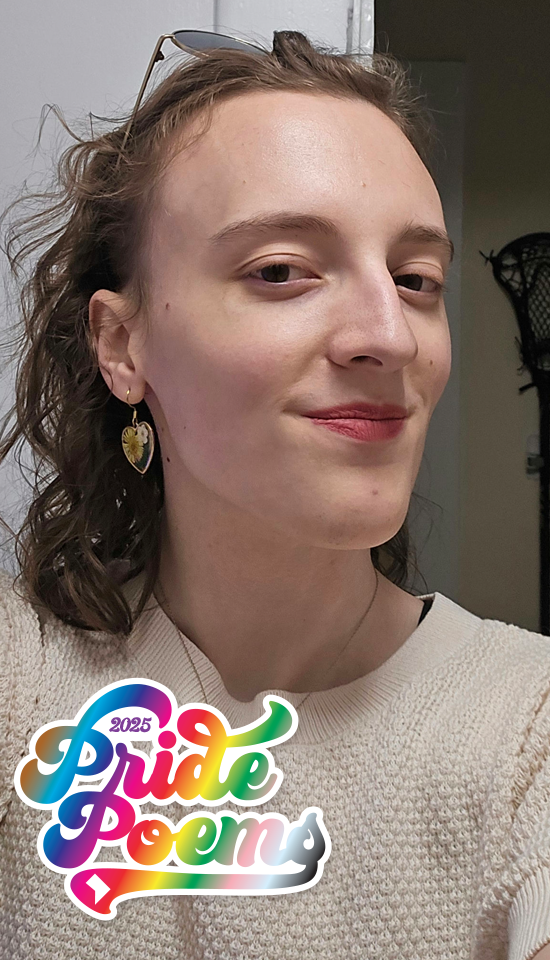
View Poem TextView Poet Biography
He is not a bed but a black hole. I do not sleep in
but descend a liquored well pressed against itself.
He does not swallow but tempt absence,
and in this way he is any other star.
I do not rest but stretch into a grave.
These are not sheets but his event horizon,
dense enough to bend light like a lens
through space, invisible.
He is not a surface but a boundary,
not to say I move beyond him,
or call the mind to picture passage.
Rather, so much gathers at that distant edge.Oread Frias has no idea what she’s doing and hopes no one finds out. She likes to drink tea and eat good food. She writes about identity and obsesses over the little things. She’s working on a book of video game poetry. Oread is on Bluesky at lovelyoread.bsky.social.
“hanahaki” by Ishanee Chanda
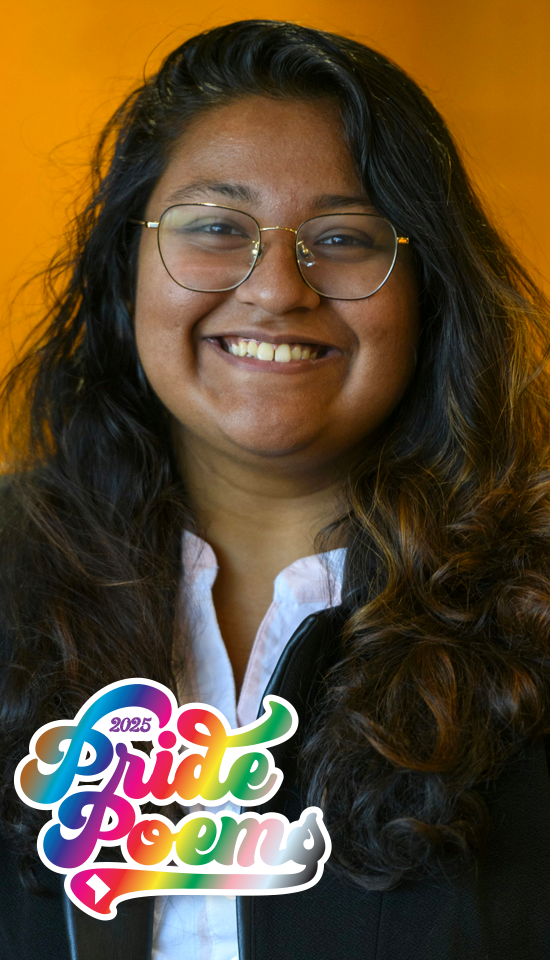
View Poem TextView Poet Biography
hanahaki
i pull flower petals from my mouth
two at a time
and i stuff them into the cracks
of her bedroom as i leave –
three behind the dresser mirror,
two behind the candle in the corner,
four tucked in the space beneath her pillow.
i take the stems with me and cough
up the blood once i’m gone.
when she asks me about it the next day,
i do nothing but smile at her with
daffodils between my teeth.
they say it will come for me in two
months, if not three,
and i spend my time looking at her instead.
the rose of her cheeks,
the silk of her fingers,
the roots of her hair.
after all, they’ll cover my grave
when i leave.Ishanee Chanda is a prose writer and poet from Dallas, Texas. She is the author or two books of poetry titled “Oh, these walls, they crumble” and “The Overflow.” Ishanee currently resides in Washington, D.C. where she works full-time in the field of humanitarian aid. She enjoys playing badminton in the summer, singing loudly to Taylor Swift, and spending time with her little family.
Ishanee Chanda is a resident of Mt. Vernon.
N/A“Nobody Knows the Will of God” by Amuche Nwafor
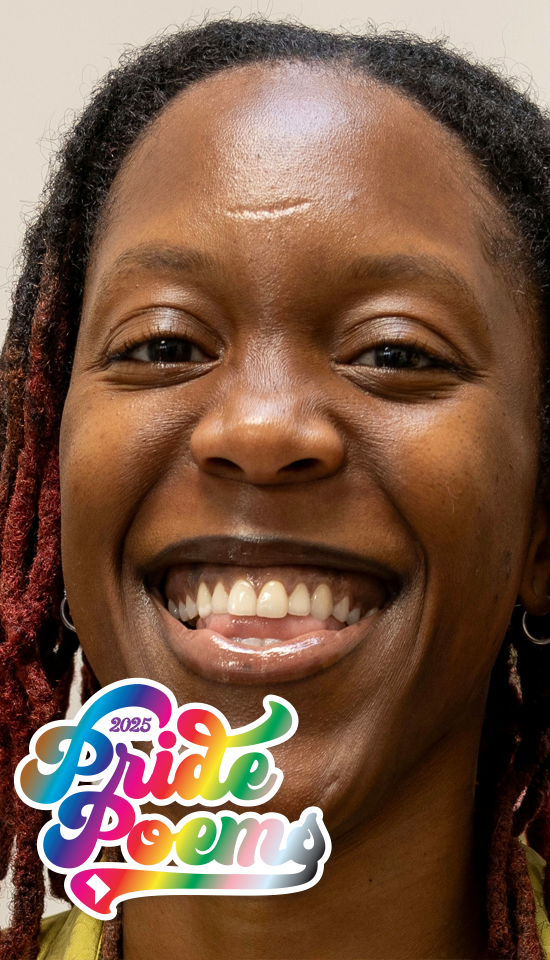
View Poem TextView Poet Biography
Amuchechukwu is Igbo for
Nobody knows the will of God.
It also means God willing or Inshallah.
I was named by my father,
Who named me after his sister.
My name is a marker in this world
Of my patriarch.
Of my father’s land.
Of Nigeria.
Amuchechukwu is such a fitting name
For a woman who does everything by faith.
I might not know where or how
I will land but I often take leaps,
And while
I never land perfectly on my two feet,
I’ve never fallen on my face.
It is the will of God
That keeps me on my knees.
My name is a marker
Of my patriarch.
Of my father’s land.
Of Nigeria.
I wear my name like a crown.
It is a jewel
From a country that I’ve never been to.
Every year, I put up miles in the sky
Traveling back and forth
To my mother’s land
But I’ve never been to my father’s.
I’ve never been welcomed into the arms
Of my aunties and uncles abroad.
At times my crown is heavy.
Sometimes my name is a burden.
It reminds me of a culture and identity
In which I am loosely acquainted.
Sometimes I feel like a guest
In my own presence,
Or a shadow of who I am supposed to be.
I only know Nigeria through
Jodeem,
Prayer songs from my childhood,
And some movies, but mostly Afrobeats.
Seventy percent of Uber drivers in the DMV are African.
And many of them are Nigerian.
Every time I book a ride,
I am reminded that I am
The only Amuchechukwu that does not know
The state in Nigeria where her father is from.
I do not know the village
of my father’s fathers’
Or their mothers’.
My father was prophetic in naming me.
Maybe it is by the will of God
That I must stand alone
As Nigeria’s forgotten love child.
I am a diamond in the rough.
My father is the pressure
That adds value to my shine and luster.
Maybe his abandonment is a gift.
My name and my life are jewels
That I alone,
Have had to learn how to treasure.
Heavy is the head that wears the crown.
Amuchechukwu.
Nobody knows the will of God.Amuchechukwu Nwafor (Amuche The Poet) is a DC based writer, performance artist, host, event curator, educator and teaching artist. She is a first-generation born Black American whose poetry touches on the diaspora, sexual advocacy, mental health, and the female experience. Amuche considers her poems to be still life paintings of intimate experiences, emotions and observations. Her debut collection of poetry, Salt Water Roots, was published October 2024 in collaboration with the DC Poet Project and the DC Commission on the Arts and Humanities. Through her writing she aspires to heal, grow and inspire people from all different walks of life.
Amuche Nwafor is a resident of Brookland.
Previously appeared in Salt Water Roots by Amuchechukwu Nwafor. Reprinted with permission of Amuchechukwu Nwafor.“Saint Jovite” by Carlota roby
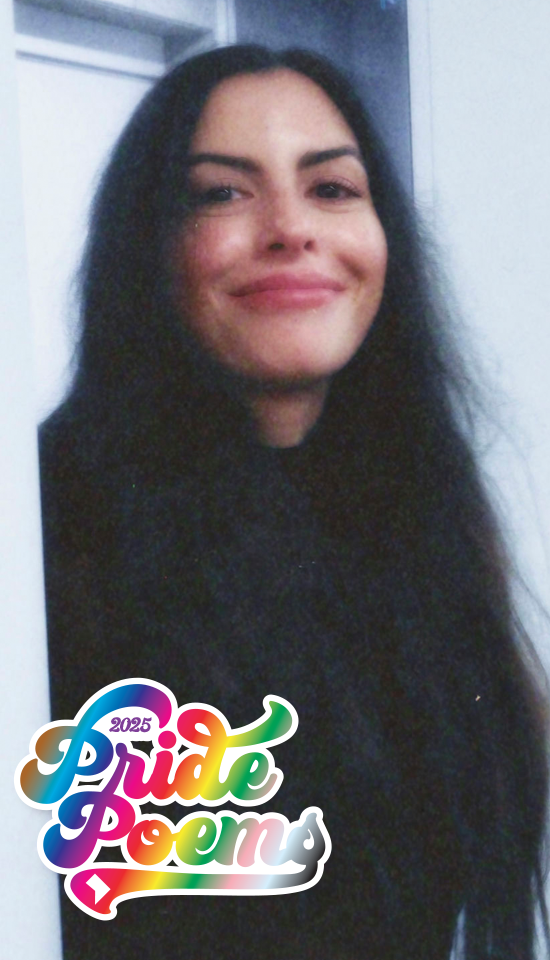
View Poem TextView Poet Biography
Saint-Jovite
You used to talk about traveling
like an ethereal spirit,
seeing a horizon without end
from the window
of a small house, nestled in the mountains.
Perhaps it was Saint-Jovite where you envisioned yourself;
we surrounded you on that journey and watched
the machines indicating your heartbeat
and your breath.
It was a tragicomic image;
we were there,
expectant,
as if death
were about to announce herself.
Perhaps we were waiting for her to open
the door of the Intensive Care Unit,
to glance at our shoes as she passed by
to await some esoteric experience.
But death, as we expected,
did not come.
It only came in other forms,
eyes darkened
fumbling for an exit.
As the poet said:
Where did we expect to find death?
It was right in front of us,
raw and cruel,
a wounded beast,
while we held your hand and told you
— sometimes lying —
“the nurse is coming and they’re going to increase your morphine dosage.”Carlota Roby is a Venezuelan/American poet and human rights attorney. She loves cats, democracy and freedom.
Carlota roby is a resident of Adam’s Morgan.
Previously appeared in my book of poems LILITH published by Tintapujo and Vocales Verticales“Time Traveling” by Angelique Palmer
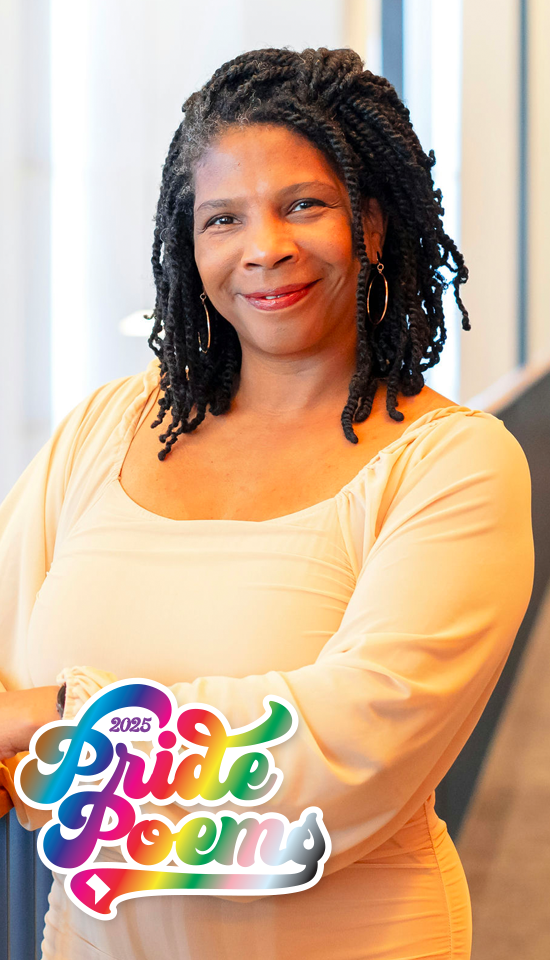
View Poem TextView Poet Biography
Time Traveling
You will answer my message, and I will want you.
You will answer my question, and we will be on a date.
It will rain a mist that’s saved for movie scenes
We will kiss a kiss reserved for love stories.
You will come to my house to kiss me good night in the days
after I will contort myself into the pleasure of back seat bruise
and an infamous sky. The first time
you will meet my daughter You will be wearing an
inappropriate t-shirt. The first time
I meet your mom I will be wearing my robe.We will break into dance often,
way too often for it to not be cute.
I will tell everyone we passed out Halloween candy together.
You will never post anything about me.
You will tell me your secrets.
I will never post anything about them.You’ll take me to the ER when I cannot breathe.
I will walk your dog during your double shifts.
You will call yourself my partner. You will ask me to move my stuff out.
I will live out of the bag in the back seat of my car.
I will apologize a lot for that.We will talk about attachment styles and love languages.
And that will not mean anything,I will take you to my office party.
You will take me on vacation.
Something will break down in the tenuous.
Somehow, our wonderful will fade.
Someone will remind you of what you haven’t done.
I will promise you room to do it.It will not be a lie.
You will be good at saying no but treating me like yes.
You will kiss me properly
on my stairs one more time
before you say I took you too seriously.
We will both make art about us.I’ll say I will change your life,
months before it is evident,
I won’t even rate a goodbye.
We will dance together close, intimate– in the middle of the night.
Somehow our wonderful will fade
into a phantasm, that will learn to haunt me best.
I will say I will change your life
and hate
that it is you who will change mine.Angelique Palmer is a performance poet, Kindergarten Teacher, and Spoken Word instructor at Wilkes University. She is in her first year of a three-year tenure as Fairfax County Poet Laureate. A finalist in the 2015 Women of the World Poetry Slam, she’s currently ranked 19th among the top 96 competitive poets in the world. Her second full-length book is 2021’s ALSO DARK, on Etruscan Press.
“The Levee” by K. Rose Dallimore
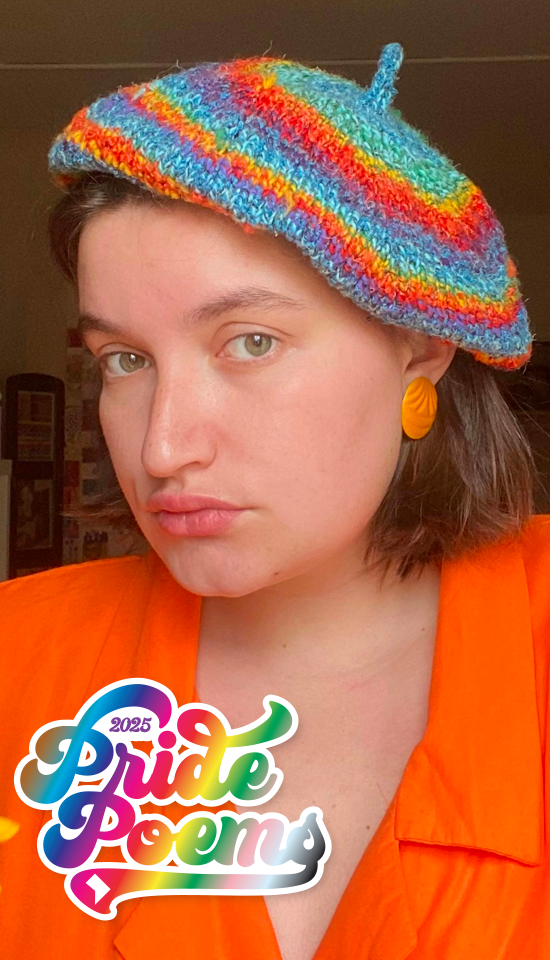
View Poem TextView Poet Biography
The Levee
The water scratches and laps
at her denim body
with the quiet rage of
a disappointed mother.Her stance is strong–
the trees on her side,
twisting their roots securely
around sneakers and shins.Wind and rain have whipped
wild points into her hair
and her brown eyes, sans serif,
stare down the work ahead.Her writhing heart
looks still from here,
and her face does not bear passion;
suffering is not always
so marketable.Her arms are strong
but bruised, shaking,
and so, so tired.
She remembers a time she held
flowers, car keys, canned beans,
a letter that made her smile.
Do you think this was a choice?Love her.
Please love her.
Place lilies by the riverside.
Send a prayer to the moon.
Tell someone you know.
Tell everyone you know.
Put your lips to hers, even,
if you can bear the current.If the dyke breaks,
so will the rest.K. Rose Dallimore is a D.C.-based poet, playwright, educator, restorative practitioner, and disability advocate. Her writing has appeared in Rough Cut Press, Anodyne Magazine, The Wild Umbrella, The B’K, Lenticular, the Alexandria, VA city bus system, and Genrepunk, among others. She published Intake, her debut chapook, with Bottlecap Press in 2024.
- Find K. online:
- i
K. Rose Dallimore is a resident of Adams Morgan.
“Ode To My Sandals” by Regie Cabico
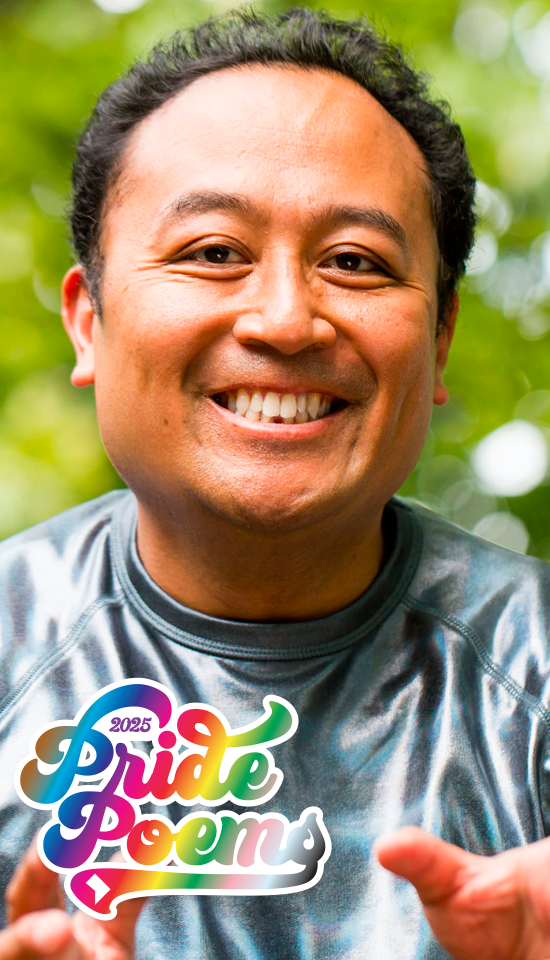
View Poem TextView Poet Biography
Ode to My Sandals
Oh, ache of pavement!
Oh, Dr. Schrolls with 3 black straps
Wrapping metatarsals.Oh, soft sandals that should come
With jelly rubber balls –
My slippery seals in a circus!When I walk along the SW Wharf
For a Pain Killer cocktailMy feet beg to be squeezed
As if they were size 10 Meyer lemons
Strolling in a summer stormMy arches want the knuckle strength
Of a tenacious, tender carabao to plough
My knotted fields of plantar fasciaAnd the dry pebbles of my phalanges
Those piggies popping the leather
Scraping a hole into the hard sole.At night, my sandals scatter
Like a couple on the verge of divorce
One detests my stompity floppity beatThe other caresses the sore arches
Of tippy toe balletic relevésThese are not therapeutic sandals or sexy sandals
They are Peppermint Patty sandals
Well, one is Peppermint PattyThe other is Marcie
They may not be very sexual
But they’re very very queerRegie Cabico is the author of A Rabbit In Search of a Rolex (Day Eight, 2023) and is the interim executive director for A Gathering of the Tribes in New York City.
Regie Cabico is a resident of Union Market.
Reprinted by Permission of the author, Regie Cabico